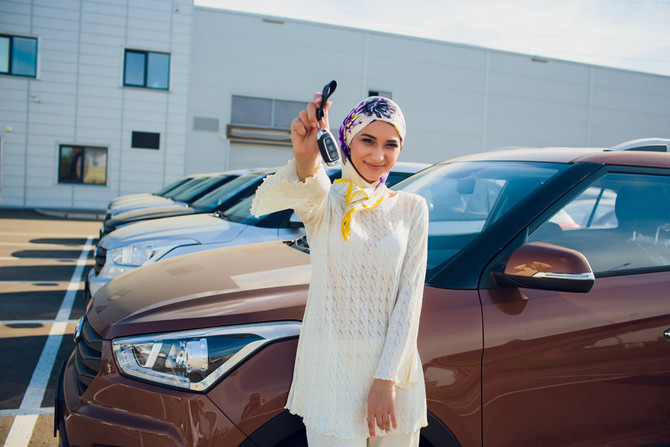JEDDAH: Women drivers will bring about a huge economic recovery and bring down unemployment among Saudi women, as new jobs will be created that were not previously available to women — in the traffic department and car rental offices, for example.
The most significant change in the car rental market is that new company branches will be opened in universities, government departments and institutions. This will accordingly help to reduce the number of drivers in the Kingdom.
When Arab News toured car rental offices in Jeddah, many of them said they would have a training program to enable male and female Saudis to work in this field.
Salaries in car rental companies start at SR4,500 ($1,200). Nawaf Alghahtani, 25, a Saudi worker in car rental, said he started his job in a rental office three months ago and earned about SR5,000.
Fahad Taher, a customer services employee at another rental outlet, told Arab News: “Allowing women to rent cars will not change our pricing policies as we try to keep the prices the same, even during holidays and on special occasions.”
Khalid Zahid, CEO of Budget Saudi Arabia, said there are no restrictions on women availing the services of car rental companies.
He said the only requirement to rent a car in the Kingdom is to have a valid Iqama or national ID and a valid Saudi driver’s license in case of a resident or national. However, valid GCC driver’s licenses are also acceptable.
In Saudi Arabia, you must be over 21 to rent affordable car brands and over 23 and above for luxurious brands. The same thing goes for women drivers, said Hattan Madani, a Budget customer service employee.
He also told Arab News that training for employees before they start work in this sector is not limited to men. “Training does not differentiate between male or female. They are both eligible to take the courses, which include video and scenarios showcasing all the steps and ways to deal with the job.”
There is an e-training program called Doroob which one can use to get trained any time and from anywhere. It offers accredited certificates that are officially recognized by top employers in the Kingdom. These certificates also give their holders priority when applying for a job.
It is an integrated program sponsored by the Human Resources Development Fund.
The CEO of Budget Saudi Arabia is optimistic about the effect women drivers will have in the Kingdom’s car industry.
“Today almost half the population consists of women. Let’s say 5 percent starts driving. Some of them will buy and some will rent cars. In the end, the outcome will be positive, and this will be better reflected in 2019,” he explained.
Zahid believes there will be a positive effect on Saudi households and the business sector. “When a company wants to rent cars for their sales employees, they rent them in large quantities. These cars are used for staff transportation,” said the Budget CEO, adding that women drivers will increase the request for these cars.
Budget has women working in various locations, mostly hotels around the Kingdom. Zahid said although hotels have pleasant environments they are bombarded by people of different attitudes and backgrounds, so it is truly a test for their female staff.
“We are also starting to inject our car sales showrooms and various parts of our operations with women across the Kingdom. This will help a lot, especially when women enter showrooms to buy cars or rent them,” said Zahid, because this will result in smoother transactions.
The Budget CEO believes that women driving in the Kingdom will also increase demand for their “At your doorstep” service where customers can order a car and it will be delivered to their door in three hours.
He said he truly believes that women obtaining a driving license will help economically. He explained that the income of the household would stay within the household. Income spent on transportation for drivers and taxis will go back into the household, and the money will stay within the economy. Women will be able to buy and rent cars.
This step will also benefit by creating more jobs for women within the car industry, such as working as taxi drivers and in car showrooms. “So it is not just about women driving but rather how the economy will benefit from it,” the Budget CEO concluded.






























